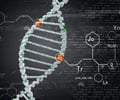A new study says that the unique mechanism behind the evolutionary survival of the human Y chromosome may also be responsible for a range of sex disorders
A new study says that the unique mechanism behind the evolutionary survival of the human Y chromosome may also be responsible for a range of sex disorders, from failed sperm production to sex reversal to Turner Syndrome.
Roughly six years ago, David Page's lab at Whitehead Institute for Biomedical Research reported the discovery of eight large areas of mirror-imaged genetic sequences, or palindromes, along the Y chromosome. Because the Y chromosome essentially has no partner with which to swap genes, a process that between ordinary chromosome pairs leads to genetic diversity and the exchange of good genes for damaged ones, it relies on its own palindromes to swap genes with itself. The Y, as it turns out, folds itself in the middle of palindromic regions, thereby pairing identical sequences to allow for potentially beneficial genetic exchange.At the time, the finding provided explanation for why, despite much-heralded reports to the contrary, the Y chromosome is not doomed to extinction. Now, the Page lab has discovered that the Y's process of self-preservation can randomly go awry, with considerable clinical consequence.
"This is the sequel to the Y chromosome palindrome story," says Page, Whitehead Institute Director and a Howard Hughes Medical Institute investigator.
>
Source-Eurekalert
RAS















